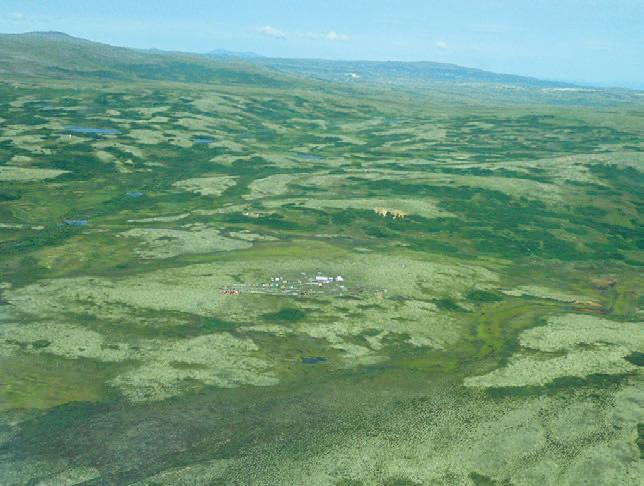
6 minute read
Protecting Wild Alaska: Pebble permit
FEDS BLOCK PEBBLE MINE PERMIT
BY CHRIS COCOLES
The roller coaster ride that is the Pebble Mine saga took an exhilarating turn for one side of the fight, and a painful loop-the-loop for another.
On Nov. 25, the U.S. Army Corps of Engineers announced it would reject a proposed Bristol Bay gold and copper mine that critics argued could devastate the region’s massive salmon runs.
The Corps reversed course after an August release of its Environmental Impact Statement that would have green-lighted a scaled-down mine – provided the Pebble Limited Partnership and parent company Northern Dynasty Minerals came up with a mitigation plan to help prevent damage to Bristol Bay’s vast wetlands.
In his agency’s record of decision, Col. Damon Delarosa, Corps of Engineers Alaska district commander, concluded that the mine’s overall scope was not up to federal Clean Water Act standards and the potential threat to the ecosystem.
“I have concluded that the benefits of the proposed elimination and alteration of wetlands, streams and other waters within the (Army Corps) jurisdiction do not outweigh the detriments that would be caused by such eliminations and alterations, based upon the information contained in the FEIS, the extensive public comments received, and the analysis of the public interest review factors,” Delarosa wrote at the end of the 29page document. (Find it at pebbleprojecteis.com.)
“As those eliminations and alterations would be necessary to realize any benefits from the proposed project, I have found that the proposed project is contrary to the public interest.”
The bedrock underneath Bristol Bay’s vast network of salmon-filled waters is rich in gold and copper deposits, but at least for now a mining permit has been rejected by the President Trump-led U.S. Army Corps of Engineers. (ENVIRONMENTAL PROTECTION AGENCY)
WELCOME NEWS FOR MINE OPPONENTS From lodge owners to the fishing industry, from Alaskans to out-of-staters, the fight to stop Pebble Mine seemingly is an endless loop of protests. So while the release of a somewhat unfavorable EIS in August was distressing, the permit getting the heave-ho offered a reason to be grateful, and fittingly it came the day before the Thanksgiving holiday.
“Good riddance. The opposition to this project from all corners of the political spectrum runs strong and deep. The process has played out, and the science is clear. There is no way this ill-conceived project can coexist with Bristol Bay salmon,” said a blunt Nelli Williams, Alaska director of Trout Unlimited.
Bristol Bay-area lodge owners Nanci Morris Lyon and Brian Kraft depend on salmon, trout and other aquatic delights that attract anglers from around the world.
Morris Lyon, whose family operates Bear Trail Lodge, said she was “relieved and thankful” for the news, while Kraft’s reaction reflected the long battle he and others have fought to block the mine.
“Thousands of us have looked forward to this day for well over a decade,” said the Alaska Sportsman’s Lodge owner. “Kudos to this administration for seeing this project for what it was – a half-baked and risky proposal that does not belong in the heart of Bristol Bay. This is a good day. We should all celebrate and be thankful today, and get ready to achieve long-term pro-
tections next.”
That said, for some the mood right now seems to be one of cautious optimism given the back-and-forth battles among the principles and the uncertainty of future plans.
“Sometimes a project is so bad, so indefensible, that the politics fall to the wayside and we get the right decision. But denial of a permit does not mean Bristol Bay is safe from the threat of the Pebble Mine,” warned SalmonState executive director Tim Bristol. “The critical next step is to reestablish the Clean Water Act protections for America’s greatest salmon fishery – protections that should have never been done away with in the first place. This can and should be an early priority for the Biden administration.”
DECISION ‘POLITICALLY MOTIVATED’ When the news broke about the mine’s permit being rejected, it capped a tumultuous fall for the Pebble Limited Partnership and its lead company, Northern Dynasty Minerals. Pebble Partnership CEO Tom Collier resigned after incriminating videotaped conversations surfaced.
It was believed that the heavy Republican influence both in Alaska and under the administration of President Donald Trump would benefit the Pebble group, particularly when the EIS seemed mostly favorable when it was released in August of an election year. But Trump’s son Donald Jr., an outdoorsman who fished Bristol Bay as a guest of Bear Trail Lodge’s Morris Lyon, publicly opposed the mine, as did other conservative voices in Washington, not to mention increasing pushback from Alaska’s U.S. senators, Lisa Murkowski and Dan Sullivan.
The Corps’ record of decision was a crushing blow for the mine’s chances of being dug anytime soon, particularly with the November victory of President-elect Joe Biden. Indeed, Northern Dynasty’s reaction to getting spurned included the argument that it was “politically motivated.” The irony there is that Collier boasted about having Republican support when the “Pebble Tapes” were secretly recorded and released.
“For the United States to turn its back on an opportunity to develop these minerals here at home in a manner that U.S. regulators have agreed is environmentally safe and responsible, and to do so for purely political reasons, is not just short-sighted,” said Northern Dynasty president and CEO Ron Thiessen. “It’s self-destructive.”
It’s unknown the extent of appeals Northern Dynasty, whose stock prices

With so much at stake for the fishing industry, both lodge owners and Native leaders in Bristol Bay were encouraged that their fight to block the mine took another positive step. “Pebble is not welcome in Bristol Bay,” Bear Trail Lodge owner Nanci Morris Lyon said. “Now we can work toward the future without the shadow of Pebble hanging over our heads.

(THOMAS QUINN/UNIVERSITY OF WASHINGTON) plummeted by over 50 percent after the news of the permit rejection broke, will take after this potentially devastating setback to its project’s viability.
But it’s the complete opposite mojo for those who have worked tirelessly to help protect the waters of what is considered the “world’s last great sockeye salmon fishery,” including Alaska Sporting Journal since we began publication 10 years ago. One of the most vocal opposition against the mine has been the United Tribes of Bristol Bay, whose Native people have fished these pristine waters over multiple generations.
UTBB board president Robert Heyano summed up the joy that, at least for now, these waters and the fish that return there will remain protected.
“The people of Bristol Bay have long known that our home is no place for a mine like Pebble. Today, we celebrate the appropriate action taken by the USACE in finally acknowledging this underlying truth: Pebble’s proposal is too toxic for our region and cannot be built without devastating the environment that sustains our cultures and communities,” Heyano said. “But our work is not done. We will continue to advocate for permanent protections for Bristol Bay until we are sure that our pristine lands and waters will remain intact for our children’s children and all future generations.” ASJ










